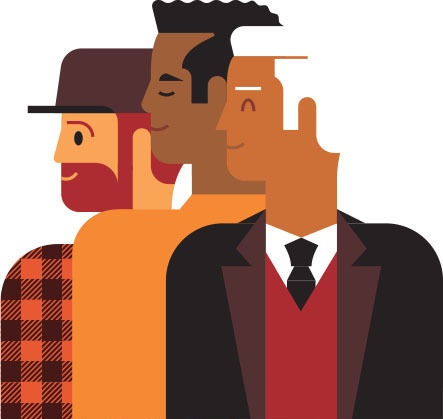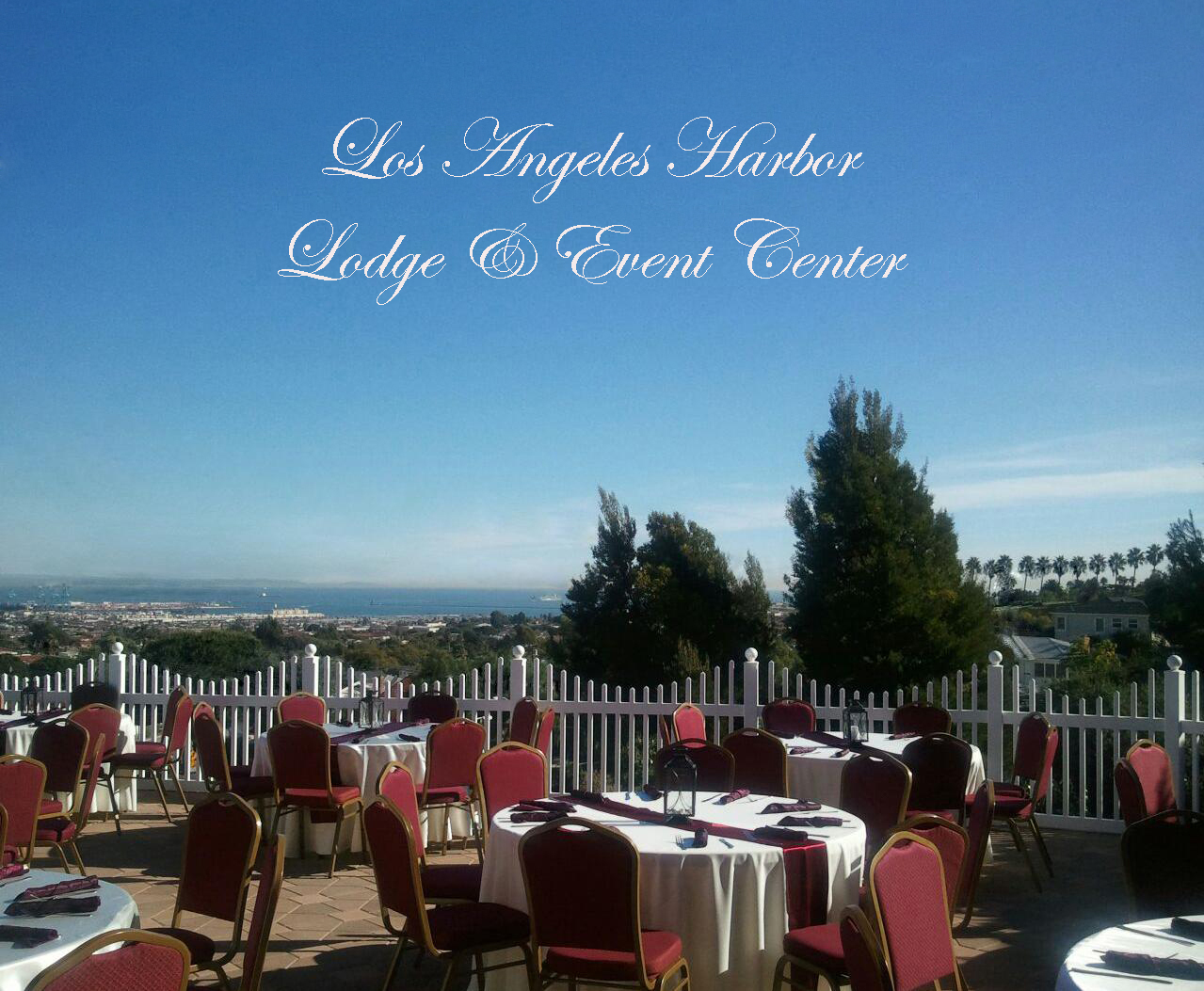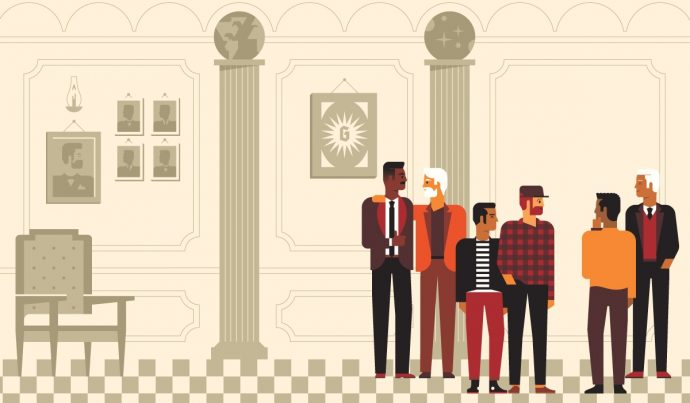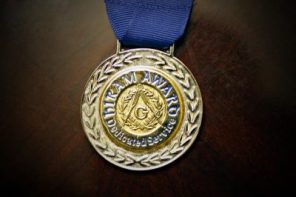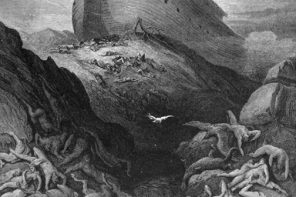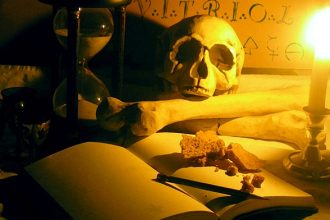Someday soon, Ricardo Torres Jr. intends to bring his 92-mile-per-hour fastball to the major leagues. With it, he hopes to add his name to the long list of public figures who are California Freemasons, including John Steinbeck, his hometown’s most famous native son.
When some fan asks him about his first brushes with Masonry, he may tell the story of standing in an Oakland, California, parking lot one June night after an A’s-Yankees’ game, 18 years old, stranded. His car had been stolen. He pulled out his phone and checked the time: 11 p.m. It would take more than three hours for someone to come get him and drive back to Salinas. His dad’s work shift began at 4 a.m.
He called his lodge brother and asked for a lift. It had been two weeks since his Entered Apprentice degree.
A SORT OF ALCHEMY
When the circumstances are right, a sort of alchemy occurs between a man and the fraternity. The man’s character, the lodge’s efforts, and the experience of the ritual come together for a transformation: The man becomes a Mason. He sees himself a little differently. He approaches the world a bit more thoughtfully. All this begins with his arrival on the lodge’s doorstep as a so-called “prospect,” and the process of determining whether he will pursue an application for membership. As Masonry is intended to be a lifelong commitment, this is no small thing to sort out. It’s what his time as a prospect is for. The lodge’s job is to put him at ease and make him feel valued, rather than scrutinized. Leaders must ensure that both sides ask the right questions, and that they have created an environment that facilitates sincere answers. Most of us are not at our best in unfamiliar situations; the lodge must find a way to coax a prospect’s heart out of his chest and onto his sleeve. The prospect’s job is to be open and honest.
Alexis Baloji remembers entering Washington Lodge No. 20 for a stated meeting dinner last June. It was a Thursday, and he had walked the half-mile from his home in Sacramento. He was looking for a community of upstanding people. He was eager to discuss the laws of the universe.
Baloji’s English is heavily accented in French. He was born in the Democratic Republic of the Congo, and grew up in Brussels. “I was a little bit nervous because I did not know what to expect,” he admits. But as it turned out, what he remembers most about that first dinner is “the feeling of peace and joy” in his heart. He remembers good conversation, and the respect his brothers showed him. A group of young men from DeMolay, a Masonic youth organization, were present, and he was impressed with how they carried themselves. “The brothers I met during these dinners were friendly and open,” he says. “I felt that I had known them for many years.”
Because of the way Washington Lodge welcomed him, Baloji’s interest blossomed. He returned to two more dinners, and his feelings were reinforced. By the time he submitted his application, he had made certain promises to himself: He was ready to give his free time to the lodge. He was ready to follow the fraternity’s teachings and devote himself to its principles. He hoped, more than anything, to “shine as a good example of honesty and integrity.”
The quality of a member is not a matter of background, social standing, or any superficial factor. It is a question of his innermost character and motivation, and how they interact with Masonry. Is he willing to put in the effort that the craft requires? Will he have the patience for its lessons? Does he understand the commitment he’s making?
In other words: Is his heart in it? Lodges must ask themselves a version of this question every time they consider a prospect. For some, this question signals a parting of ways. For others, like Baloji, it’s a precursor to understanding where the basis of Masonry resides within each man.
FINDING ONE’S PLACE
There was a time, not long ago, when United States lodges concerned themselves less with the measurement of individual quality and more with the counting of heads. They handed out applications after cursory introductions, with virtually no knowledge of the candidate’s intentions. Lately, membership development has taken a different view. Freemasonry in Europe, with its average lodge size of 34 brothers, has long shown that the membership total isn’t what matters. Smaller lodges in California are now proving it too. The quality of brothers, not quantity, is what determines a lodge’s health.
This means each and every prospect has the potential to shape his lodge. But even the finest among them needs encouragement.
Santa Monica-Palisades Lodge No. 307 is led this year by Master Scott Gilbert. “We’ve made a conscious decision: We want prospects to understand what the commitment is,” Gilbert says. “We want them to feel important, and for them to understand that they’re joining a community. They may come in looking for one thing, but they will discover many more layers within the fraternity.”
Eight years ago, Gilbert showed up at Santa Monica-Palisades Lodge, new to Masonry. He and his wife had just had their first child, and he was searching for a way to get involved in community service. He liked the brothers immediately, and was intrigued by what he gleaned of Masonry. But he also remembers feeling a bit at sea after he submitted his application, unsure how he fit in or what was expected of him. It wasn’t until he inserted himself more fully into lodge activities that he started to consider himself part of a brotherhood. Eventually, he realized that he had found more than a vehicle for community service; he and his family had gained a new community altogether. Gilbert started to map out his role in it.
Perhaps he saw something of himself in Matthew Giborees, another young father who found the lodge a few years later. Giborees came to Santa Monica-Palisades Lodge to sort fact from fiction. He’d heard pop-culture conspiracy theories, but was struck by the U.S. early presidents and founding fathers who were Masons. He was drawn to the promise of making good men better.
“I wanted to be like the men that I look up to,” Giborees says. “Freemasonry seemed to provide a path to help me emulate my heroes.”
Gilbert and other lodge leaders kept in touch with Giborees, encouraging him to attend events, to volunteer alongside the lodge at its annual book fair and at the Midnight Mission charitable organization, and eventually, after he had become a Mason, to chair the Cooking Committee with other new members.
Without this kind of early involvement and follow-through, prospects and new Masons are always on the verge of drifting away. By contrast, in the two years since Giborees’ introduction to the fraternity, he’s embraced his responsibility in its future. He wants to carry Masonry forward so that his two boys — Eli, age 3, and Dominic, 9 months — might someday share his experience. “I hope to help the fraternity preserve its traditional and classic feel,” Giborees says. “That’s the thing I love most about it. It’s the one place you can go that hasn’t changed.”
“The world is in a state of disconnect. We’ve lost our relationships and don’t even realize it,” he adds. “It’s easy to be egocentric and ignore the world around you. Freemasonry has taught me that life and everyone in it are connected.”
AN INSTANT CONNECTION
When Torres, the teenage baseball player from Salinas, stepped into his first lodge, “I didn’t know what I was going to find,” he says. He was curious about the Masonic symbols he’d noticed on license plates, and a cornerstone on his college campus. These chance encounters had led him to do an online search that ended here, a stated meeting dinner at Salinas Lodge No. 204.
James Riley rose to greet him. Riley punctuates text messages almost exclusively with exclamation points, and describes people as “the fuel that keeps me going.” Many Masons talk about the lifelong friendships they develop in the fraternity; Riley makes it his business to start them. He keeps an eye out for the men who wander into lodge dinners looking not quite sure what to expect. He is often the first to walk up and offer his hand. “I get them talking about their hobbies, and they light up,” he says. “Then I find somebody else with a similar hobby, and introduce them. Now they have a connection, and that could be a lifelong friendship.”
More than five decades separate him and Torres (Riley is 73), but nevertheless, when Riley welcomed the young man to Salinas Lodge that night, they hit it off. Riley remembers thinking, “I like that kid. He’s got some pluck.”
“I just clicked with him,” says Torres. “We sat and talked, and we had things in common.”
Torres was energized immediately by the principles and structure of Masonry, and regards its legacy with awe. “I’m learning the same things George Washington learned,” he says. Despite a rigorous baseball and class schedule, he threw himself into the work. His degree coaches met with him almost daily for his first and second degrees; with their support, he moved through all three degrees in three months so he could become a Master Mason at age 18. (The ceremony was held the day before his 19th birthday.)
His friendship with Riley developed at a similar pace. By the time he’d submitted his application to the lodge, he was accompanying Riley to car clubs and learning to change the oil on vintage cars. As he progressed through the degrees, he got in the habit of joining Riley and other Salinas brothers when they attended events at neighboring lodges. They planned a day trip down to San Luis Obispo to tour the historic building of King David’s Lodge No. 209.
Riley was the brother who Torres called when he found himself stranded. “I have childhood friends that I would say are my brothers, but I don’t think they would be willing to drive 100 miles to pick me up in Oakland at 11 o’clock at night,” Torres says. “My Masonic brother was — and I would do the same.” Today, if he has a long drive ahead of him, such as a trip to Los Angeles to visit friends, “Jim is just one of those people besides my parents and my sisters that I call to say I’m OK,” he says. Riley does the same for Torres when he’s on the road all day for work.
One day this summer, Riley stopped by Torres’ college baseball game to watch him pitch, and a woman introduced herself as Torres’ mother. She thanked him for looking out for her son. She asked if she could give him a hug.
“I have no children. I’m an only child, so I don’t have nieces or nephews. I really think of him as a kind of surrogate nephew now,” Riley says.
After Torres submitted his application for degrees, Riley asked if he’d like him to be his mentor. “You already are,” Torres replied.
BECOMING A MASON
In the handful of months since Torres first walked into Salinas Lodge, his mother has told him repeatedly that she sees him becoming a better man. He feels his relationship with his parents and sisters deepening. He brought his father to his first stated meeting dinner over the summer, and his brother-in-law recently asked how he might become a Mason, too.
As the youngest member of the lodge, Torres does not feel out of place. He feels lucky. He was going through his degrees when his grandmother passed away, and found himself looking forward to coaching sessions as much for the moral support as for the instruction. “The knowledge of an older person is so valuable nowadays,” he says. “These brothers aren’t here because they want something out of me. They say, ‘I’m going to help you’ and it’s genuine. They want me to be safe. In today’s world, you don’t find much of that. And I would do anything for a brother. If anybody needs anything from me, I’m there.”
Every lodge has their Rick Torres, their Alex Baloji, their Matt Giborees: prospects who seem to light up around Freemasonry as if recognizing an old friend. Under the right circumstances, they might become Masons.
It’s up to lodges to encourage them. This often begins quietly, by treating them as the lifelong friends they could become, and helping them recognize the Masonic qualities already within them. As Torres describes it, it’s a matter of the heart. “You know you’re a real Mason, because there’s a certain feeling you get when you do something good,” he says.
What follows is the future of Freemasonry. These days, Torres sees endless possibilities for good. He also notices Masonic symbols everywhere he turns. It gets him thinking about what lies ahead. “Some of the streets in my town are named after Masons. These men reflected great honor on my city,” he says. “I’d love to reflect honor on our fraternity too. We need to keep this secret alive. I would love to keep our lodge active throughout the years, so that Masonry is still around in Salinas when my children grow up.”
“It’s up to us to carry ourselves accordingly,” he says. “To do good things. Contribute well to society. Clean up the community. Then, generations to come are going to like what they see — and they’re going to remember that Masons made this.”
by Laura Benys
Reprinted by kind permission from the Grand Lodge of California’s “California Freemason.”
